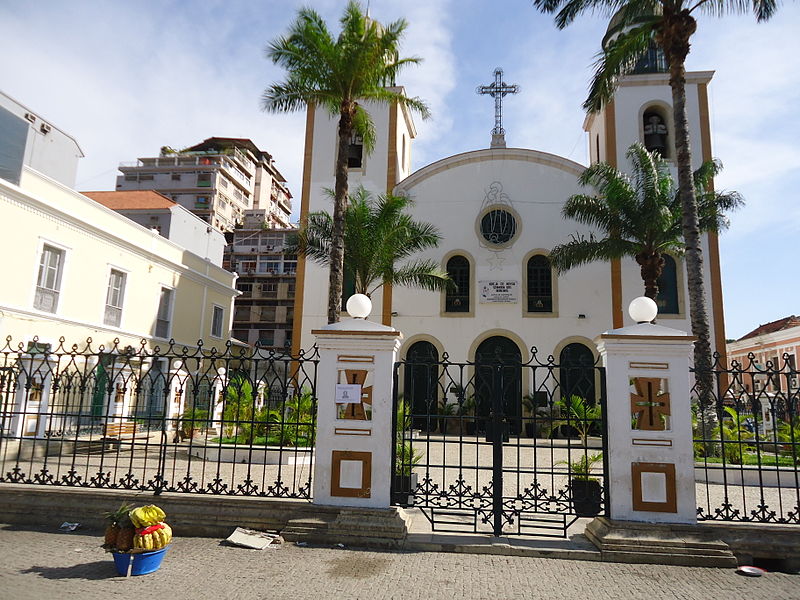
Religion in Angola
From Angola: Law and Religion Framework Overview Paula Kane (Dorsey & Whitney), 2017
Located in southwestern Africa,Angola is the seventh-largest country in the continent. It is bordered by Namibia to the south, the Democratic Republic of the Congo to the north, Zambia to the east, and the Atlantic Ocean to west. The Cabinda exclave is also a province of Angola, having some of the largest offshore oil fields in the world. As of July 2016, the U.S. Government estimates Angola’s total population to be at 25.7 million. The Angolan Statistics National Institute’s projection of Angola’s total population for 2017 is 28,359,634. In 2014, Angola started a population census (Censos 2014) with the main purposes of, inter alia, (i) counting all the population present, non-present and non-resident in the territory, (ii) identifying the distribution of population in the territory, and (iii) updating the existing demographical and socio-economic information.
Originally a colony of Portugal, Angola achieved its independence in 1975, after the War of Independence, which lasted from 1961 to 1974. After achieving independence from Portugal, Angola entered a period of civil war between the Popular Movement for the Liberation of Angola (“MPLA”), led by José Eduardo dos Santos, and the National Union for the Total Independence of Angola (“UNITA”), led by Jonas Savimbi. This conflict lasted twenty-seven years until Savimbi’s death in 2002, which solidified the MPLA’s position of power. In 2010, President dos Santos pushed through a new constitution based on the principle that the leader of the party with the most seats in the Assembly would become president. In 2016, he was re-elected without opposition as party leader. After almost four decades, the country has a new President. In September 2017, João Lourenço was elected Angola’s third president, after the MPLA secured the necessary parliamentary majority.
The largest ethnolinguistic group in Angola is the Ovimbundu, located in the central and southern areas and speaking Umbundu. The second largest group, which is the Mbundu, is concentrated in the capital, Luanda, and in the central and northern areas and speak Kimbundu. The third largest group, the Bakongo, speaks variants of the Kikongo language and also lives in the north. The languages currently spoken in Angola are: non-Bantu (bosquimana or bochimane); Bantu (umbundu, kimbundu, kikongo, cokwe, kwanyama, ngangela, etc.) and Portuguese. The majority of Angolans speak Portuguese.
Religious Context
Prior to European colonization, the various groups of Angolans followed similar religious traditions, venerating ancestors and worshipping deities under a creator god (often known as Nzambi or Suku). Portuguese settlers brought Christianity to the region in the 15th century, and in the late 19th century Protestant missionaries came to Angola and converted numerous Roman Catholics as well as followers of traditional religions. Baptists operated in the north, mainly among the Bakongo, while Methodists preached in the Kimbundu-speaking regions, and Congregationalists in the areas of Ovimbundu settlement and in the east, in addition to smaller communities of Lutherans and reformed Protestants. In more recent decades, African independent churches, like Our Lord Jesus Christ Church in the World (Tocoist church), have proselytized from bases located in other countries, like the Democratic Republic of the Congo. Since the end of the civil war in 2002, charismatic, evangelical, and Pentecostal churches have grown fast led by Brazilian, Nigerian and Congolese missionaries. The practitioners of traditional African religions are a small minority, of a residual nature.
Approximately 41% of the population of Angola is Roman Catholic, 38% is Protestant, and 12% is not affiliated with any religion. The remaining 10% includes members of indigenous religious groups, Muslims, and others. According to the U.S. Government, there are an estimated 80,000 to 90,000 Sunni Muslims, most of whom are immigrants from West Africa, and approximately 350 Jews.
Angola’s constitution states that it is a secular state, but recognizes religious diversity and freedom. However, in practice the Government has been inconsistent in its protection of religious freedoms. A violent clash between police and members of a millennial sect called The Light of the World (a break off of the Adventist church) in early 2015 led to several deaths and the eventual conviction of the sect’s leader. While the Government reported about 22 deaths resulting from the incident, 9 police officers included, opposition groups have claimed that more than 1,000 members of the sect were massacred.
Muslim groups also reported in 2015 that security forces demolished two mosques in the Zango and Catinton neighborhoods in Luanda Province. The State promulgates a negative and fearful image of not only Islam, but its practitioners, many of whom are illegal immigrants. In addition, the Government has discriminated against many indigenous belief systems, which use shamans and perform animal sacrifices. There are also concerns over the mistreatment of Catholics in Cabinda who have vocalized their discontent with the Angolan Government’s control over what they believe to be their land.
For more, see the link below:
